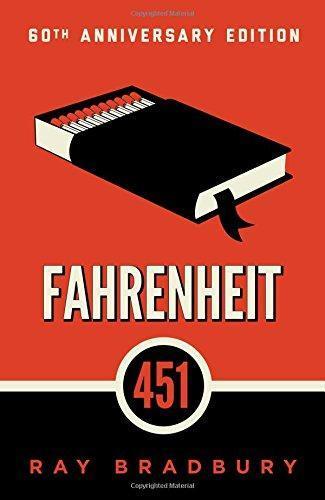English language
Published June 26, 2013

English language
Published June 26, 2013
Sixty years after its original publication, Ray Bradbury's internationally acclaimed novel Fahrenheit 451 stands as a classic of world literature set in a bleak, dystopian future. Today its message has grown more relevant than ever before.
Guy Montag is a fireman. In his world, where television rules and literature is on the brink of extinction, firemen start fires rather than put them out. His job is to destroy the most illegal of commodities, the printed book, along with the houses in which they are hidden.
Montag never questions the destruction and ruin his actions produce, returning each day to his bland life and wife, Mildred, who spends all day with her television “family.” But then he meets an eccentric young neighbor, Clarisse, who introduces him to a past where people didn’t live in fear and to a present where one sees the world through the ideas in books …
Sixty years after its original publication, Ray Bradbury's internationally acclaimed novel Fahrenheit 451 stands as a classic of world literature set in a bleak, dystopian future. Today its message has grown more relevant than ever before.
Guy Montag is a fireman. In his world, where television rules and literature is on the brink of extinction, firemen start fires rather than put them out. His job is to destroy the most illegal of commodities, the printed book, along with the houses in which they are hidden.
Montag never questions the destruction and ruin his actions produce, returning each day to his bland life and wife, Mildred, who spends all day with her television “family.” But then he meets an eccentric young neighbor, Clarisse, who introduces him to a past where people didn’t live in fear and to a present where one sees the world through the ideas in books instead of the mindless chatter of television.
When Mildred attempts suicide and Clarisse suddenly disappears, Montag begins to question everything he has ever known. He starts hiding books in his home, and when his pilfering is discovered, the fireman has to run for his life.
This sixtieth-anniversary edition commemorates Ray Bradbury's masterpiece with a new introduction by Neil Gaiman; personal essays on the genesis of the novel by the author; a wealth of critical essays and reviews by Nelson Algren. Harold Bloom, Margaret Atwood, and others: rare manuscript pages and sketches from "Ray Bradbury's personal archive and much more. Here, at last, is the definitive edition of a classic of world literature. (front flap)
Incroyable qu’un roman écrit il y a plus de 70 ans puisse à ce point résonner avec l'actualité de 2025. Ray Bradbury expose une société totalitaire sans tyran où, sous prétexte d’apaiser les âmes et de satisfaire la multitude des minorités – professions, religions, associations, etc. – les romans sont brûlés, les intellectuels, au mieux, exilés. Le pompier incendiaire Montag rencontre une jeune femme qui instillera le doute dans son esprit, lui permettant de s'affranchir, d’ouvrir les yeux. Les écrans publicitaires, les caméras, les voisins délateurs, les robots chasseurs de têtes : nous sommes projetés dans une dystopie effrayante et visionnaire avec, qui plus est, dans cette traduction de Jacques Chambon et Henri Robillot, une véritable qualité littéraire.
Incroyable qu’un roman écrit il y a plus de 70 ans puisse à ce point résonner avec l'actualité de 2025. Ray Bradbury expose une société totalitaire sans tyran où, sous prétexte d’apaiser les âmes et de satisfaire la multitude des minorités – professions, religions, associations, etc. – les romans sont brûlés, les intellectuels, au mieux, exilés. Le pompier incendiaire Montag rencontre une jeune femme qui instillera le doute dans son esprit, lui permettant de s'affranchir, d’ouvrir les yeux. Les écrans publicitaires, les caméras, les voisins délateurs, les robots chasseurs de têtes : nous sommes projetés dans une dystopie effrayante et visionnaire avec, qui plus est, dans cette traduction de Jacques Chambon et Henri Robillot, une véritable qualité littéraire.
I had read this book a long time ago and remembered it as a difficult read - my english was not quite on the same level as it is today. When re-reading it now i was blown away. An amazing story paired with wonderful storytelling. After reading "boring" contemporary novels this was delightfully refreshing
I had read this book a long time ago and remembered it as a difficult read - my english was not quite on the same level as it is today. When re-reading it now i was blown away. An amazing story paired with wonderful storytelling. After reading "boring" contemporary novels this was delightfully refreshing
É uma distopia clássica, li há muito tempo mas lembro de não ter achado tão envolvente quanto as primas mais famosas (1984 e Admirável Mundo Novo). Recomendo o conto "Bright Phoenix" que inspirou o livro (é curtinho e achei melhor que o livro).
É uma distopia clássica, li há muito tempo mas lembro de não ter achado tão envolvente quanto as primas mais famosas (1984 e Admirável Mundo Novo). Recomendo o conto "Bright Phoenix" que inspirou o livro (é curtinho e achei melhor que o livro).